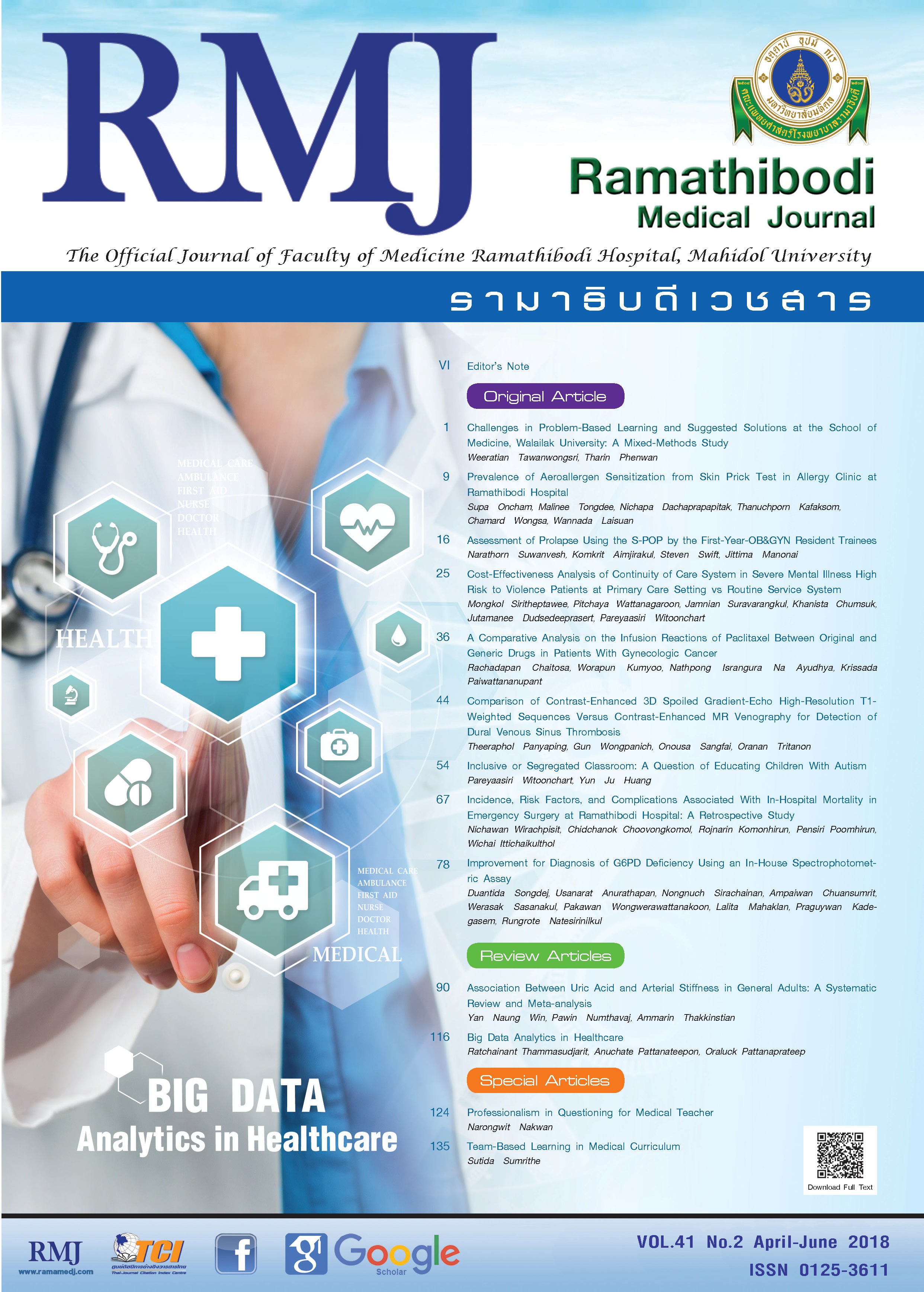Challenges in Problem-Based Learning and Suggested Solutions at the School of Medicine, Walailak University: A Mixed-Methods Study
DOI:
https://doi.org/10.14456/rmj.2018.11Keywords:
Medical education, Pre-clinic, Medical students, Facilitators, Problem-based learningAbstract
Background: Problem-based learning (PBL) was used in basic and clinical sciences learning in an integrated approach. Despite its implementation into medical curricula around the world over four decades ago, group dynamic issues in PBL are still abundant. To date, there is no publication addressing the difficulties in PBL for Thai medical students.
Objective: To explore difficulties in PBL and suggest solutions at the School of Medicine, Walailak University.
Methods: A sequential explanatory mixed method was employed using the triangulation method to get the information from students, facilitators, and a medical curriculum expert. Anonymous online survey data from students emphasised barriers to PBL and respondents’ suggestions. Content analysis was performed on written feedback from facilitators. Finally, a researcher performed a semi-structured interview with a medical curriculum expert. Data were collected throughout the academic year 2016.
Results: A total of 83 (86.5%) medical students responded to the survey, 58 students (69.9%) reported no difficulties in their learning process; 25 students (30.1%) disclosed challenges in learning. Facilitators’ feedback was collected from a total of 23 PBL sessions. Factors affecting the PBL process included facilitators’ characteristics, course organisation, and learning environment. Favourable characteristics for facilitators included thinking process support (28.7%), appropriate and constructive feedback (27.9%), listening skills (24.3%), safe environment (14.0%), and being concise (5.1%).
Conclusions: Three major factors contributing to PBL difficulties among Thai medical students were facilitator’s quality, course organisation, and learning environment. Hence these factors should be optimized to allow students to achieve the best learning process and outcome.
ปัญหาที่พบบ่อยในกระบวนการเรียนรู้โดยใช้ปัญหาเป็นฐานและแนวทางการแก้ไขปัญหา สำนักวิชาแพทยศาสตร์ มหาวิทยาลัยวลัยลักษณ์: การวิจัยแบบผสม
บทนำ: การเรียนรู้โดยใช้ปัญหาเป็นฐาน (Problem-based learning, PBL) ได้รับความนิยมผนวกเข้ากับการจัดการเรียนการสอนเพื่อบูรณาการความรู้วิทยาศาสตร์พื้นฐานและวิทยาศาสตร์ทางคลินิก แม้ว่าโรงเรียนแพทย์หลายแห่งบรรจุการเรียนรู้โดยใช้ปัญหาเป็นฐานในหลักสูตรแล้ว แต่ยังไม่มีผลการวิจัยที่กล่าวถึงปัญหาการเรียนในมุมองของนักศึกษาแพทย์ไทย
วัตถุประสงค์: เพื่อระบุปัญหาการจัดการเรียนการสอนแบบการเรียนรู้โดยใช้ปัญหาเป็นฐาน พร้อมแนวทางการแก้ไข ณ สำนักวิชาแพทยศาสตร์ มหาวิทยาลัยวลัยลักษณ์
วิธีการศึกษา: การวิจัยแบบผสมประเภทการออกแบบต่อเนื่องเชิงอธิบาย (Sequential explanatory mixed-method) ตรวจสอบสามเส้าด้านข้อมูล (Data triangulation) โดยรวบรวมข้อมูลจากแบบสอบถามออนไลน์แบบไม่ระบุตัวตนจากนักศึกษาแพทย์ ชั้นปีที่ 3 และปีที่ 4 ข้อมูลป้อนกลับจากวิทยากรกระบวนการ และสัมภาษณ์ผู้เชี่ยวชาญด้านหลักสูตร โดยเก็บข้อมูลตลอดปีการศึกษา 2559 ณ มหาวิทยาลัยวลัยลักษณ์
ผลการศึกษา: นักศึกษาแพทย์ที่ตอบแบบสอบถาม จำนวน 83 คน คิดเป็นร้อยละ 86.5 พบว่า ร้อยละ 69.9 ไม่มีปัญหาการเรียนรู้โดยใช้ปัญหาเป็นฐาน และมีเพียงร้อยละ 30.1 ระบุปัญหาการเรียนรู้โดยใช้ปัญหาเป็นฐาน จากการรวบรวมข้อมูลป้อนกลับของวิทยากรกระบวนการจำนวน 23 ครั้ง พบปัจจัยที่มีผลต่อการเรียนรู้โดยใช้ปัญหาเป็นฐาน ได้แก่ ลักษณะของวิทยากรกระบวนการ การจัดการเรียนการสอน และสิ่งแวดล้อมการเรียนรู้ โดยลักษณะของวิทยากรกระบวนการพึงประสงค์ ได้แก่ สนับสนุนกระบวนการคิด ให้ข้อมูลป้อนกลับที่เหมาะสม มีทักษะการฟังที่ดี สร้างสิ่งแวดล้อมปลอดภัย และกระชับเนื้อหา
สรุป: ปัจจัย 3 ประการสำคัญที่ส่งผลกระทบต่อการเรียนรู้โดยใช้ปัญหาเป็นฐาน ได้แก่ คุณภาพของวิทยากรกระบวนการ การจัดการเรียนการสอน และสิ่งแวดล้อมการเรียนรู้ ดังนั้น การปรับปัจจัยดังกล่าวอาจทำให้การเรียนรู้โดยใช้ปัญหาเป็นฐานช่วยส่งเสริมผลการเรียนรู้ได้ดียิ่งขึ้น
References
Schmidt HG. Problem-based learning: rationale and description. Med Educ. Jan 1983;17(1):11-16.
Schmidt HG, Rotgans JI, Yew EH. The process of problem-based learning: what works and why. Medical education. Aug 2011;45(8):792-806.
Khoo HE. Implementation of problem-based learning in Asian medical schools and students' perceptions of their experience. Med Educ. May 2003;37(5):401-409.
Maneechotirat M, Satayasai W. Satisfaction of Students for Problem-based Learning in Faculty of Medicine, Thammasat University. Thammasat Medical Journal. 2005;1:9-16.
Ahmed Z. Problems of group dynamics in problem based learning sessions. J Ayub Med Coll Abbottabad. Apr-Jun 2014;26(2):230-234.
Houlden RL, Collier CP, Frid PJ, John SL, Pross H. Problems Identified by Tutors in a Hybrid Problem‐based Learning Curriculum. Academic Medicine. 2001;76(1):81.
De Grave WS, Dolmans DH, Van Der Vleuten CP. Student perspectives on critical incidents in the tutorial group. Adv Health Sci Educ Theory Pract. 2002;7(3):201-209.
Hendry GD, Frommer M, Walker RA. Constructivism and Problem‐based Learning. Journal of Further and Higher Education. 1999/10/01 1999;23(3):369-371.
Gwee MC. Problem-based learning: a strategic learning system design for the education of healthcare professionals in the 21st century. Kaohsiung J Med Sci. May 2009;25(5):231-239.
Walsh A. The Tutor in Problem Based Learning: A Novice’s Guide Hamilton, ON, Canada: McMaster University, Faculty of Health Sciences; 2005.
Yee HY, Radhakrishnan A, Ponnudurai G. Improving PBLs in the International Medical University: defining the 'good' PBL facilitator. Med Teach. Sep 2006;28(6):558-560.
Gilkison A. Techniques used by "expert" and "non-expert" tutors to facilitate problem-based learning tutorials in an undergraduate medical curriculum. Medical education. Jan 2003;37(1):6-14.
Wood SJ, Woywodt A, Pugh M, Sampson I, Madhavi P. Twelve tips to revitalise problem-based learning. Medical teacher. Nov 17 2014:1-7.
Young L, Papinczak T. Strategies for sustaining quality in PBL facilitation for large student cohorts. Advances in health sciences education : theory and practice. Oct 2013;18(4):825-833.
Mubuuke AG, Louw AJ, Van Schalkwyk S. Utilizing students' experiences and opinions of feedback during problem based learning tutorials to develop a facilitator feedback guide: an exploratory qualitative study. BMC medical education. Jan 11 2016;16:6.
Jaques D. Teaching small groups. BMJ (Clinical research ed.). Mar 01 2003;326(7387):492-494.
Taylor D, Miflin B. Problem-Based Learning. Dundee, UK: Association for Medical Education in Europe (AMEE); 2010.
Norman GR, Schmidt HG. Effectiveness of problem-based learning curricula: theory, practice and paper darts. Medical education. Sep 2000;34(9):721-728.
xe, les RF, Strodtbeck FL, Mills TM, Roseborough ME. Channels of Communication in Small Groups. American Sociological Review. 1951;16(4):461-468.

















